Dentures – Arlington, TX
Simply Stunning Smile Restoration
At Foundation Dental Solutions we take a unique approach to our denture patients. Dr. Baldwin has recognized over the years that patients were not happy with the function and artificial look of their dentures in Arlington. After talking with individuals and listening to their concerns, he has come up with a system to ensure his dentures look natural and beautiful and are functional and affordable. His system is called “Simply Stunning Dentures.” To learn more about these reliable prosthetics, contact us to schedule an appointment.
Who is a Good Candidate for Dentures?

Facing the reality of missing teeth can be challenging, leading many patients to consider restorative dentistry options. While the ideal treatment option varies depending on individual needs, those with significant tooth loss may find dentures in Arlington to be a suitable option. However, it's crucial to ensure they’re right for you before making a decision. Click on the button below to learn what things you should consider about this treatment process!
Effects of Missing Teeth
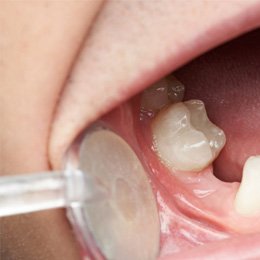
Losing teeth can happen for various reasons, from gum disease and cavities to accidents. Some inherited disorders can also increase the odds of tooth loss later in life. Regardless of the cause, it's crucial to address any gaps in your smile. When teeth are missing (except wisdom teeth), it can lead to neighboring teeth shifting or jawbone loss. Ignoring it may bring issues like difficulty eating, speaking, facial changes, and lower self-confidence.
What Qualifies You for Dentures?

Patients suffering from tooth loss can typically expect to receive the green light when inquiring about traditional dentures. Whether you are interested in full or partial dentures or even implant dentures, Dr. Baldwin will provide a thorough examination of your oral cavity to determine three key factors:
- The extent of your tooth loss (if you’re only missing a few teeth, you will only need a partial denture)
- If you require any preliminary treatments (i.e., periodontal therapy, tooth extraction, bone graft)
- The state of your overall health, which can make a drastic difference when seeking implant dentures
Alternative Tooth-Replacement Options

If dentures aren't the right fit for you, or if you've lost only one or two teeth, we may suggest other options. Here are some popular alternatives our team offers:
- Dental Bridges – Ideal for those missing one or more teeth in a row, dental bridges rely on healthy adjacent teeth for support. With proper care, they can last 10 to 15 years, restoring your smile effectively.
- Dental Implants – For a more comprehensive and long-lasting solution, consider dental implants. These titanium posts rebuild missing teeth from the roots up, offering superior stability. With minimal care, they can last several decades to a lifetime, providing a durable and natural-looking smile.
What Are the Different Types of Dentures?
Dr. Baldwin is pleased to provide patients with three different types of dentures, ensuring everyone receives the appropriate prosthetic based on their individual needs:
Partial Dentures
Partial dentures are used when patients have lost some but not all of their natural teeth. This prosthetic is designed much like a puzzle piece so it can fit into a unique series of gaps, effectively replacing the missing teeth while allowing the rest of a patient’s original smile to remain intact. They consist of a set of artificial teeth anchored to a base that replicates the gum line, and they stay in place with the help of a metal clip or frame. Like full dentures, the traditional versions are also removable for the patient’s convenience and comfort.
Full Dentures
When patients have lost most or even all of their teeth, eating is not the only problem they experience – the ability to properly pronounce words can become difficult, and over time, their facial appearance can suffer due to jawbone deterioration. A full denture can provide you with the renewed support, stability, and cosmetic quality you need. A full denture is designed to replace either the upper or lower arch of teeth, or both at once when there’s been total tooth loss.
Your dentist in Arlington will create a precise impression of your mouth that is used to build your new, customized denture with true craftsman-level quality. Then, once the final restoration is done, we will make any adjustments needed to ensure an ideal fit. Although traditional full dentures are held in place with the help of natural suction, dental adhesive can be added for extra stability. They’re also removable, allowing for easy cleaning and more comfortable sleep.
Implant Dentures
With the transformative power of implants, Dr. Baldwin can take your prosthetic to the next level by creating a foundation in your mouth to which the denture can be securely attached. You can choose a removable denture, or we can anchor it in place with dental implants, so the result is as natural and seamless as possible – the choice is yours!
How Dentures are Made
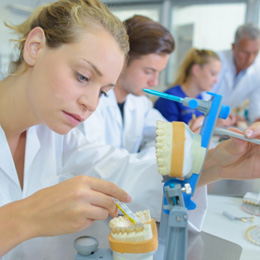
Before you commit to dentures, you’ll likely want to learn how they’re made. It’s only natural – knowing what goes into restorations helps you make a better treatment choice. That said, we have good news: our practice will gladly share the details on denture creation. Just keep reading to learn the relevant facts and grasp how these prosthetics emerge. Otherwise, you can also call us to hear from one of our team members.
What are Dentures Made Of?
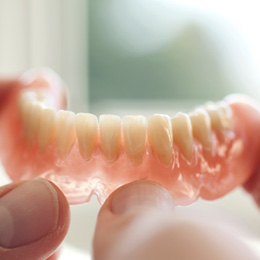
Regardless of its exact type, every denture has a base and artificial teeth. These components are crucial to the overall prosthetic and allow it to work correctly. As for their exact roles, consider them further below:
- Denture Base – Acting as a foundation, a denture’s base is the part that keeps its artificial teeth secure. The part is thus made of pink-colored acrylic or substitutes like nylon.
- Artificial Teeth – In line with their name, the artificial teeth are a denture’s tooth-replacing parts. Most labs create them from resin or porcelain to match the color of your enamel.
The Denture Creation Process
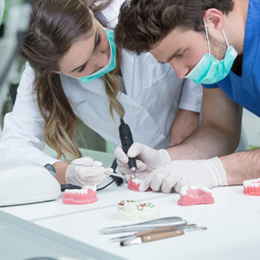
Because each denture is tailor-made for its patient, creating one is a multi-step process. The most notable of these steps include:
- Step 1: At the start, Dr. Baldwin uses a dental impression to design a plaster model. This model will match your final denture’s size and shape.
- Step 2: Our practice will send the plaster model to the lab, which will rely on it to make a wax gumline.
- Step 3: The lab will put artificial teeth in the wax gumline, forming a prototype denture.
- Step 4: We’ll check the prototype against your mouth after we get it back. From there, we’ll return it when we’ve confirmed its fit.
- Step 5: The dental lab will place the prototype in a flask after removing its wax. Next, they’ll apply plaster to the flask and have it sit in hot water.
- Step 6: To keep any acrylic from sticking, a separator will go into the plaster layer. The acrylic will then be injected into the flask to replace the wax.
- Step 7: The dental lab will remove all plaster to reveal the final denture. Then, they’ll place the restoration in a bath to remove its residue.
- Step 8: Once the residue is removed, lab workers will remove your denture’s excess acrylic and polish its surface.
- Step 9: Our office will fit your final denture for you to ensure it works properly.
Learn More About All-on-4 Dental Implants
Adjusting to Your New Dentures
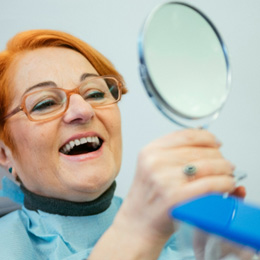
As you adjust to your dentures, your mouth may feel a bit sore and achy. Don’t worry – this effect is temporary and only lasts a few days at most. Once you’ve used your prosthetics for a while, they won’t cause any pain at all; they’ll then be very familiar to you.
Of course, there are ways to speed up your adjustment as needed. One option is to eat soft foods, as doing so wouldn’t irritate your gums. Other ideas include applying adhesives (for added security), exercising your facial muscles, and so on. These and similar measures make your new teeth feel familiar more quickly.
Don’t hesitate to call us if your adjustment pain persists. In some cases, this ache indicates your dentures need further alterations.
Benefits of Dentures

Whether you're missing a few teeth or an entire arch, you likely understand the challenges this poses for daily activities like eating and speaking. Fortunately, dentures offer an excellent solution for missing teeth, providing several outstanding benefits. These advantages will leave you feeling confident and excited about your new smile and its bright future. Keep reading to learn more!
Psychological Benefits

Your teeth are the best tools for biting and chewing! Additionally, they play a crucial role in your overall happiness and confidence. Missing teeth can significantly impact self-esteem, leading to sadness, anxiety, and reluctance to address underlying oral health issues. However, patients who receive dentures often experience an immediate boost in confidence and can comfortably resume socializing with a big, bright smile.
Clearer Enunciation

Teeth play an essential role in speech and pronunciation. Your lips and tongue rely on your teeth and their positions to form certain sounds. If you have gaps in your smile, they can affect your enunciation. Fortunately, because dentures replace all your missing teeth, they enable you to speak more fluently once you adjust to them.
Improves Nutrition

If you can't thoroughly chew your food before swallowing, you may encounter digestive issues like indigestion. Tougher foods, such as vegetables, fruits, and lean proteins, can be particularly challenging to chew. However, dentures significantly enhance your chewing ability, allowing you to optimize your diet and avoid nutritional problems down the line.
Preserves Oral Health

One of the most significant issues with missing teeth is that it can lead to the loss of adjacent teeth. Having gaps in your smile can cause nearby teeth to shift toward the open space, eventually leading to their loss. Additionally, prolonged tooth loss can result in jawbone resorption. However, with dentures, you can enjoy a complete, functional smile without worrying about bone resorption or additional wear and tear on your remaining natural teeth.
Expands Opportunity

Your smile is often the first thing strangers notice about you, making it crucial for creating positive first impressions in both professional and social settings. Research indicates that having a healthy and radiant smile significantly enhances your chances of employment, and people are more likely to approach you if your smile captivates their attention. Therefore, dentures can truly enhance your career prospects and give you an advantage in your next interview, meeting, or social encounter.
Understanding the Cost of Dentures

At Foundation Dental Solutions, Dr. Baldwin understands the cost of dentures in Arlington may be a stretch for some patients. Fortunately, not all cases are the same, which means the price will vary from person to person. The only way to know how much you can expect to spend is to schedule a consultation. We will then evaluate your smile and formulate a thorough estimate before helping you to maximize your dental insurance benefits to minimize the out-of-pocket expenses associated with treatment.
Factors That Affect the Cost of Dentures
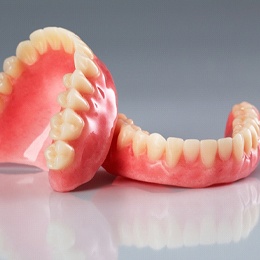
When meeting with your denture dentist in Arlington, you can expect him to go over the following factors before establishing a set price for your new smile:
- How many teeth you have lost and if you require a partial, full, or implant denture.
- Whether you require preliminary treatments before receiving dentures.
- The type of materials used to create your new teeth, which are most commonly acrylic or porcelain.
While it may be possible to seek out cheaper options for dentures, you’ll likely end up with a prosthetic that doesn’t hold up to daily wear and tear and breaks down long before it’s time for a replacement. By opting for higher quality materials and allowing our team to explain why this is a better option, you can expect your new smile to last much longer. As a result, you’ll save time and money!
Are Implant Dentures More Expensive?
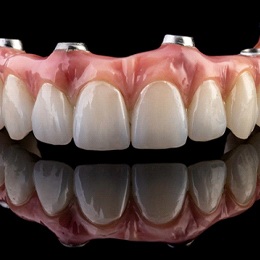
Implant dentures are known to be more expensive than traditional dentures; however, when you discover their benefits, you’ll understand why. These titanium posts mimic your smile’s natural teeth roots and fuse with the jawbone to provide a solid foundation and continuous stimulation. Once topped with a customized denture, you are free to eat all your favorite foods, speak clearly, smile with confidence, and embrace a better quality of life. They’re even known to last 30+ years or a lifetime!
Does Dental Insurance Cover Dentures?

When it comes to traditional dentures in Arlington, your dental insurance company will likely pay a portion of the total cost (up to 50%). The official percentage is based on whether you’ve met your deductible as well as how much of your existing annual maximum remains. If you prefer an implant denture, however, you may need to seek alternative payment options to assist in covering a portion of your treatment. The reason is that many companies still don’t acknowledge implants as “necessary” dental solutions.
Other Options for Making Dentures Affordable

If dental insurance is not an option, you can always apply for flexible financing through CareCredit or Lending Club. Dr. Baldwin partners with both companies to allow patients the opportunity to minimize their out-of-pocket expenses by breaking up the cost of their care across calendar months or years. By selecting a plan that works with your timeframe and budget, you can focus more on your new smile and less on the financial obligation required to achieve it.
Dentures Aftercare
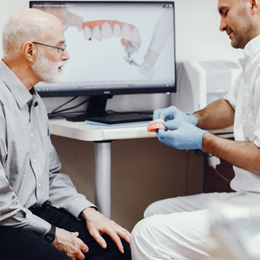
They may not be “real” teeth, but dentures still require daily care from their users. They’ll stop working (and thus put your restored smile at risk) if you don’t look after them properly. With that said, you don’t need to worry; Foundation Dental Solutions has excellent tips on caring for dentures. Using these guidelines will keep your prosthetics stable, assuming you apply them daily. Just keep reading to learn about them in detail, or call us to hear more over the phone.
Removeable Dentures
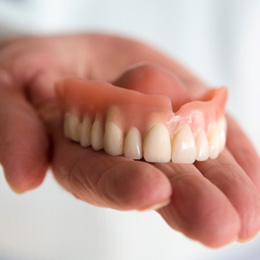
Remove After Eating
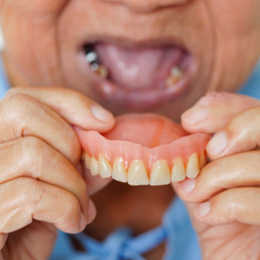
It’s crucial that you remove and rinse your dentures after meals. By doing so, you remove built-up plaque and other “leftovers” that can cling to your prosthetics.
When applying these rinses, please don’t use hot water. High temperatures can warp denture material and cause your restorations to fit poorly. If those effects occur, you’d need to get costly denture repairs or replacements.
Clean Your Restoration
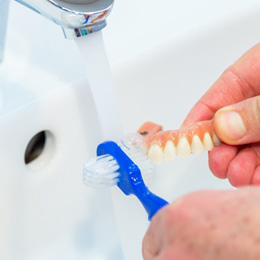
You should also clean your dentures once a day. That way, you’ll eliminate debris that a rinse over your sink might miss.
These daily cleanings shouldn’t be hard, all in all. You’ll just need to brush your prosthetic (after removing it) with a soft-bristled toothbrush and liquid soap. Using “normal” toothpaste wouldn’t be wise; this product is too abrasive for dentures. After brushing, you'll rinse your dentures and place them back in your mouth.
Keep Your Dentures Safe
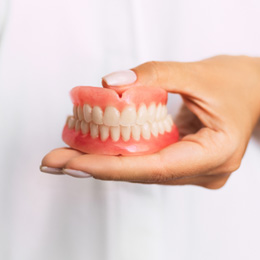
Though modern ones are sturdy, dentures can still break at times. That means you’ll need to keep your own safe from accidents, injuries, and rough handling.
Various methods would help you protect your dentures. For instance, you might place a towel in your sink during cleanings; the cloth would cushion your device from falls. You could also keep your dentures away from children or pets, preferably in a secure case.
Remove Dentures When You Sleep
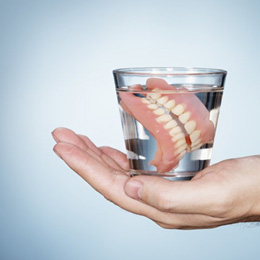
As best you can, avoid sleeping with your dentures at night. You should instead remove them before bed and soak them in a solution while you rest.
In reality, using dentures constantly is bad for you. Doing so restricts your gums’ circulation and irritates your mouth’s soft tissues. The habit also elevates your tongue’s plaque levels, putting you at greater risk of gum disease. This increase in plaque also makes severe pneumonia more likely.
Notice Changes

While wearing removable dentures, remember to check them (and your mouth) for changes. Some issues related to your new teeth – mouth sores, irritated gums, etc. – may warrant dental visits.
You’ll especially need a dentist if your dentures suffer damage. Fixing them yourself isn’t a good idea, as the attempt would probably harm your prosthetics further. On the other hand, Dr. Baldwin is an expert who can reline or replace faulty dentures.
All-on-4 Dentures
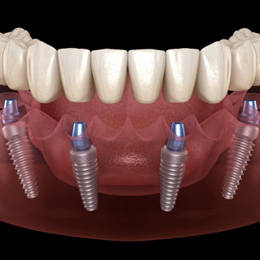
Since All-on-4 dentures can’t be removed, they require aftercare methods like:
- Twice-Daily Brushing – You should brush All-on-4 dentures twice daily with a soft-bristled toothbrush. (A sulcus brush would be especially useful, as it can clean between the restoration and your gums.)
- Once-Daily Flossing – At least once daily, floss between your denture’s teeth. You might even try floss threaders to get under the appliance.
- Regular Mouth Rinses – You should rinse your mouth with fluoridated mouthwash once day. Through this practice, you’d prevent tartar growth.
Denture FAQs
Can I Sleep with My Dentures?
Short answer: no, it’s not recommended to sleep with your dentures. It’s strongly advised that you remove the prosthetics every night before you go to bed! The only time you’ll be asked to keep dentures in your mouth for 24 hours is when you first get them. However, you should be removing them every evening following that initial use.
If you wear your dentures too often, you can restrict the circulation in your gums, which can lead to soft tissue irritation and potentially speed up ridge resorption. By taking out your oral prosthetics every night, you give your gums an opportunity to recover and get the nutrients they need during the night. In fact, it’s been discovered that sleeping with dentures comes with a higher risk of pneumonia.
Will It Hurt to Get Dentures?
It shouldn’t! Of course, getting dentures can involve some discomfort, particularly if you need to have teeth extracted beforehand. After oral surgery, it's common to experience discomfort for a few days, usually improving within 3 to 5 days. Taking prescribed pain medication as directed can help manage this discomfort.
When you first start using new dentures, you might experience minor irritation as your mouth adjusts to the appliance. The length of this adjustment period varies for each person, with some experiencing discomfort for several months. However, persistent pain should not be ignored. If this occurs, don’t hesitate to contact your dentist right away. This could indicate that dentures are not properly fitted or that there's an underlying oral health issue that needs attention.
Why Do My Dentures Smell?
Dentures can develop an odor for several reasons:
- Bacterial Buildup – Bacteria can accumulate in the nooks and crannies of dentures, especially if they’re ill-fitting and trap food particles underneath.
- Ill-Fitting Dentures – Poorly fitting dentures can irritate gum tissue, causing sores and infections that contribute to bad breath.
- Dry Mouth – Denture wearers often produce less saliva, leading to dry mouth, which creates an environment where harmful bacteria can thrive and cause bad breath.
To prevent bad breath, clean your dentures every day using a soft-bristled brush and a specialized cleaner. Be sure to brush your entire mouth, including gums, tongue, cheeks, and palate. You also need to soak your dentures in a disinfecting solution every night to keep them moist and eliminate bacteria.
Can I Use Regular Toothpaste to Clean My Dentures?
No, you should not use regular toothpaste to clean your dentures! Toothpaste is abrasive and can create microscopic scratches on the surface of the dentures, which can lead to significant damage over time.
Instead, you should use a soft-bristled toothbrush and clean your dentures with hand soap, mild dishwashing liquid, or specialized denture cleaners. Make sure to brush and rinse your dentures after every meal to maintain their cleanliness and longevity.
